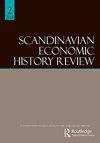移民母亲:1970-2000年瑞典官方话语中的工作、民族和种族化
IF 0.5
Q4 ECONOMICS
引用次数: 4
摘要
摘要在瑞典,移民母亲的形象一直是性别、移民和种族化话语中另类性的有力标志。在关于劳动力市场政策、社会福利和两性平等的官方讨论中,这些妇女经常被描述为一个有问题的群体。本文的出发点是认为知识生产是部署权力关系的中心舞台,目的是探讨移民妇女的母亲经历如何在瑞典政府官方报告中得到体现。这些政府报告表达了为人母、日常生活和融入瑞典社会的可能性条件是什么?移民母亲的处境与工作条件、代际传递和生育困境有何关系?这篇文章聚焦于1970年至2000年,这一时期瑞典社会发生了深刻的变革,不仅表现在不断变化的移民法规和新的性别分工上,还表现在住房、劳动力市场和获得社会福利方面出现了种族化的不平等模式。为此,本文从经济史的角度为当代关于后殖民社会中移民和种族化之间关系的辩论做出了贡献。本文章由计算机程序翻译,如有差异,请以英文原文为准。
Migrant mothers: work, nation and racialisation in Swedish official discourses 1970–2000
ABSTRACT Images of migrant mothers have been a powerful marker for otherness in discourses of gender, migration and racialisation in Sweden. These women are often described as a problematic group in official discourses on labour-market policy, social welfare and gender equality. Taking as its point of departure the belief that knowledge production constitutes a central arena for deploying relations of power, the purpose of this article is to explore how migrant women’s experiences of motherhood have been represented in the Swedish Government Official Reports (SOU). What conditions of (im)possibility for motherhood, everyday life and integration into Swedish society are expressed in these government reports? How is the position of migrant mothers related to working conditions, intergenerational transmissions and reproduction dilemmas? The article focuses on the years between 1970 and 2000, a period that was characterised by profound transformations in Swedish society expressed not only in changing migration regulations and new gendered divisions of labour but also in the emergence of racialised patterns of inequality in housing, the labour market and access to social welfare. In so doing, the article contributes from the perspective of economic history to contemporary debates on the nexus between migration and racialisation in postcolonial societies.
求助全文
通过发布文献求助,成功后即可免费获取论文全文。
去求助
来源期刊

SCANDINAVIAN ECONOMIC HISTORY REVIEW
ECONOMICS-
CiteScore
1.60
自引率
16.70%
发文量
20
期刊介绍:
Scandinavian Economic History Review publishes articles and reviews in the broad field of Nordic economic, business and social history. The journal also publishes contributions from closely related fields, such as history of technology, maritime history and history of economic thought. Articles dealing with theoretical and methodological issues are also included. The editors aim to reflect contemporary research, thinking and debate in these fields, both within Scandinavia and more widely. The journal comprises a broad variety of aspects and approaches to economic and social history, ranging from macro economic history to business history, from quantitative to qualitative studies.
 求助内容:
求助内容: 应助结果提醒方式:
应助结果提醒方式:


